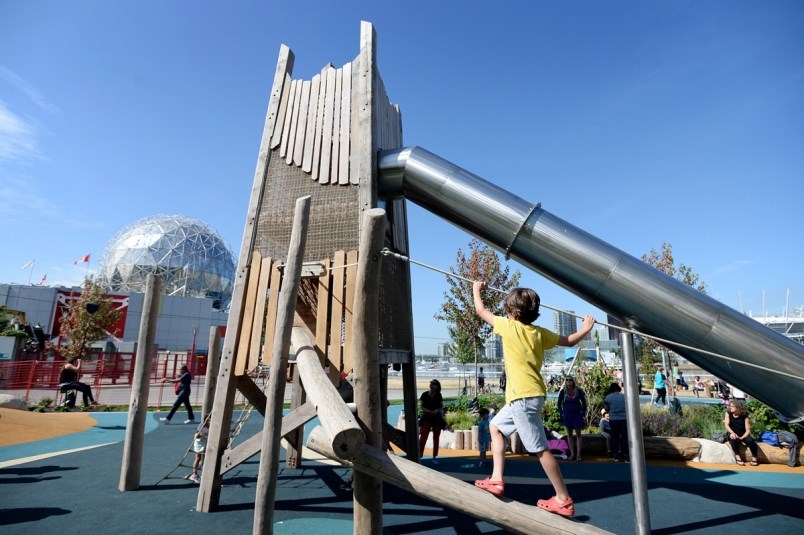All Vancouver restaurants must cease dine-in service by midnight Friday or face severe penalties for remaining open during a time when COVID-19 continues to spread in the region.
That was one of the latest measures taken by the City of Vancouver Friday as it also announced more than 160 playgrounds in parks will close and that community centres are being readied to accommodate vulnerable people who need to self-isolate.
City council is also poised to implement a 60-day grace period for all property tax payments, along with requests of the provincial government to help businesses survive in a time of economic collapse.
City manager Sadhu Johnston made the order Friday to close restaurants and suggested operators switch to take-out and delivery service, as many others have done in the last week.
“This order makes it very clear what our expectations are — no in-restaurant food being consumed, no table service,” said Johnston, noting bylaw officers will post orders on the doors of non-compliant restaurants.
He also urged residents to call the city’s 311 phone service, if a restaurant isn’t complying with the order. Johnston noted health officials issued an order earlier this week for all bars to close across the province.
Details on enforcement and nature of the penalties were not provided at the news conference at city hall, with Johnston emphasizing it was first important to issue the order.
The closures will mean layoffs and potential financial ruin for restaurant operators, many of whom pay high rents and taxes in what is an expensive city to operate a business.
Mayor Kennedy Stewart acknowledged the hardship such a move will have on restaurants, but said it was necessary to help stop the transmission of COVID-19, which has greatly affected Vancouver and the region.
“We are doing this because we think this is what we need to do to keep vulnerable people from getting seriously ill — or worse,” said Stewart, noting he’s had hundreds of business owners email him in recent days to complain about having to shut down.
“But despite this, the vast majority have done the right thing, even though it will cost them a great deal.”
The mayor pointed out that as of Thursday’s tally of coronavirus cases in Canada, the Vancouver Coastal Health region had 56 per cent of the cases in B.C. and 18 per cent of them for the whole country.
“This is why we cannot rest, we cannot slow down,” said Stewart, whose council declared a local state of emergency Thursday as part of the city’s escalation to fight the pandemic.
As he has repeatedly said, the city’s top priority remains with ensuring the needs of the city’s most vulnerable, which he pegged at 10,000 people in the Downtown Eastside, are met.
Sandra Singh, the city’s general manager of community services, said the city is working with B.C. Housing to identify spaces for people to self-isolate, if they are unable to do so.
Those spaces include community centres, which the city shut down earlier this week in the first wave of action taken by city officials since the outbreak began to escalate.
“All centres are potentially deployable for this purpose, and if the time comes for their deployment, we will need to act quickly, within hours,” Singh said.
“This is an unprecedented use of our community centres, but these are unprecedented times, and this deployment is critical for a collective effort to try to prevent the spread of the virus, and mitigate the demand on our health care system.”
In addition, peers of some of the city’s most vulnerable, which includes people who are homeless, addicted and living with a mental illness, are distributing basic public health information in the community.
That includes the importance of hand washing, other hygiene protocols, social distancing and safe drug use. The city is also working with non-profits and others to ensure food services and food banks continue to operate.
Malcolm Bromley, the park board’s general manager, announced the closure of 166 playgrounds in more than 200 parks, a move to avoid people being too close to each other and potentially spread the virus.
The beaches, meanwhile, will remain open, despite large crowds flocking to English Bay and Kitsilano this week to enjoy the sunshine. Bromley said the park board will begin an information campaign at the beaches to ensure people can enjoy the outdoors in a safe manner.
In related news, Fire Chief Darrell Reid has been appointed to lead the city’s newly formed COVID-19 task force. Reid is also in charge of the Vancouver Emergency Management Agency.
His workload required Vancouver Fire and Rescue Services to appoint an acting chief. Deputy fire chief Kiran Marohn will temporarily take over from Reid. She is believed to be the first woman in the city’s history to lead the department.
Hey #Vancouver!
— Fire Chief Darrell Reid (@FireChiefReid) March 20, 2020
I want you to meet our @VanFireRescue Acting Fire Chief Kiran Marohn (@CovKiran).
I’m ready to lead the @CityofVancouver #Covid19 Task Force, & I’m proud to have Act/Chief Marohn lead day to day operations at #VFRS.
Wish we could shake hands!#SocialDistance pic.twitter.com/Tj5y5osXyN
The news conference with city officials occurred just hours before Provincial Health Officer Dr. Bonnie Henry announced 77 new coronavirus cases, for a total of 348 in B.C.
Two hundred of the cases are in the Vancouver Coastal Health region, which includes Vancouver, Richmond, the North Shore, the Sunshine Coast and Bella Coola.
The region accounts for nearly 25 per cent of B.C.’s population.
Note: This story has been updated since first posted.
@Howellings



